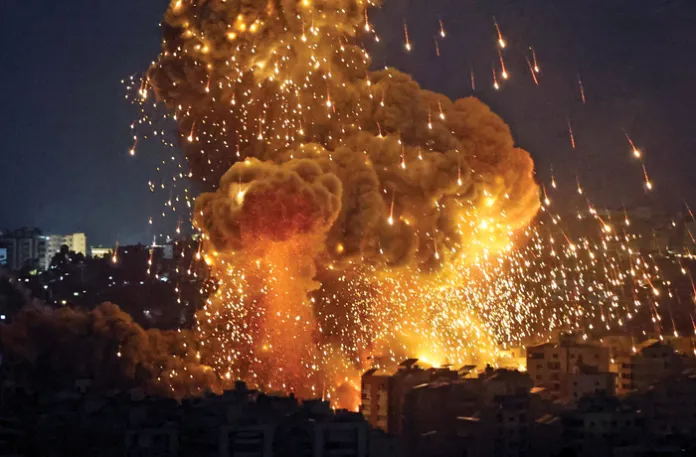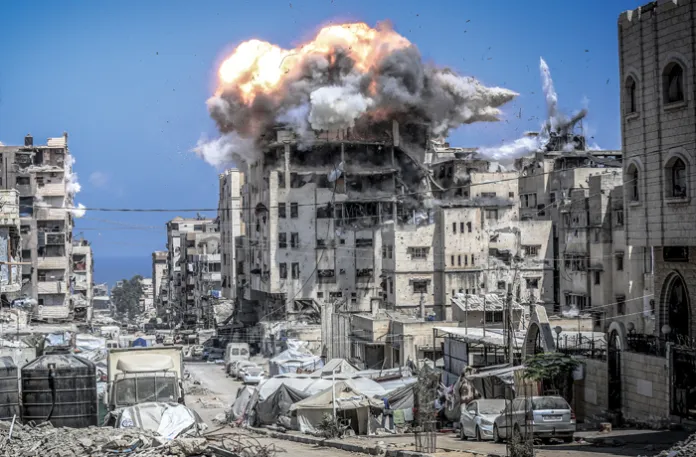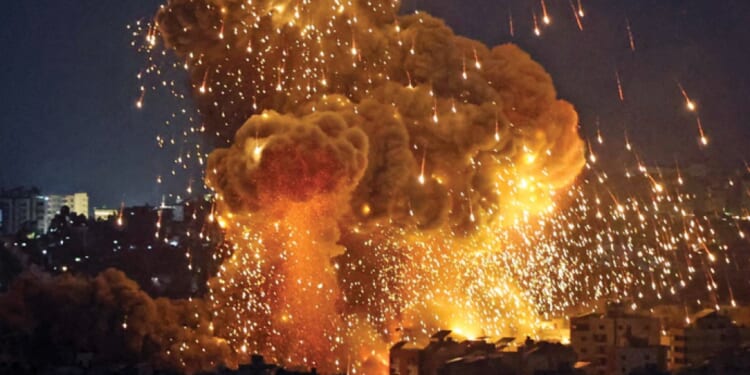As Israel solemnly marks the second anniversary of the devastating invasion it suffered at the hands of Hamas terrorists on Oct. 7, 2023, it’s fitting to take stock of where the embattled country stands. On balance, Israel has made signal gains on the battlefield, continues to struggle to complete its objectives in the Gaza Strip, faces an unprecedented international landscape, and endures anxiety tinged with hope on the home front.
The Jewish state’s war against Hamas has already become the longest-lasting campaign in Israel’s history, and it’s not done yet. More than 2,000 Israelis have lost their lives, more than half of them on Oct. 7 itself, the overwhelming majority of whom were civilians. Israel estimates it’s killed over 20,000 Hamas fighters. Forty-eight Israelis, living and dead, remain in Hamas captivity.
On its northern border, the Israel Defense Forces decimated Hezbollah, its fiercest adversary, and a hostile regime next door in Syria has been replaced by a regime with uncertain aims. Further abroad, Israel’s air force pummeled Iran’s nuclear program and the mullahs’ ballistic missile capability. And the Jewish state has degraded the capabilities of the Houthis in Yemen.

Internationally, while the United States has remained a stalwart defender, Israel’s standing has plummeted among Western countries and global organizations. A raft of once-friendly states have recognized a (nonexistent) Palestinian state and have imposed trade sanctions on Jerusalem, while cultural and sports organizations, along with prominent entertainment figures, have anathematized the Jewish state and its people.
Those people, back home, have endured two years of conflict with characteristic grace and unity, although troubling fissures have begun to appear as political and religious polarization has swelled. Throughout it all, Israelis continue to back our heroic armed forces and to draw inspiration from the generation fighting on our behalf, ever hopeful for the future.
To understand where things stand, let’s begin by examining two years’ worth of intensive warfighting.
The actual front
Israel’s campaign on no fewer than seven fronts — Gaza, the West Bank, Lebanon, Syria, Iraq, Iran, and Yemen — has yielded five significant victories and two prolonged stalemates.
Beginning with the good news, the fight against Hezbollah, which began with the dramatic simultaneous explosion of thousands of beepers in the hands of terrorists, resulted in a resounding triumph for the IDF last November. The Israeli army took out the entire leadership of the organization, including Hassan Nasrallah, its secretary-general, along with several thousand fighters and tens of thousands of rockets aimed at the heartland. The organization is now a shell of its former self, and, at long last, the Lebanese government has begun to disarm the Shiite jihadists in its midst.

Next door, just a month later, in December 2024, the despotic regime of Syrian strongman Bashar Assad — now deprived of military assistance from Hezbollah (its praetorian guard) and Russia (whose troops are being fed into the meat-grinder in Ukraine) — collapsed, giving way to a coalition of Sunni jihadis and other opposition figures. Israel quickly secured its borders with Syria, which sits to its northeast, and seized a buffer zone, including the summit of Mount Hermon, a key strategic redoubt. The vanishing of Assad, long a thorn in Israel’s side, from the scene (he fled to Moscow) marks a signal victory. Soon thereafter, allied Islamists in Iraq announced they would no longer target Israel.
Then in June, as chronicled in these pages, Israel launched a daring and decisive attack against Iran that decapitated its military leadership and nuclear program, eliminating thousands of ballistic missiles and reducing multiple atomic installations to rubble. The IDF didn’t suffer a single casualty on the battlefield (although nearly 30 Israeli civilians perished at the hands of Iranian missiles deliberately aimed at population centers) during the “12-day war,” which saw American B-2 bombers wipe out Fordow, the fortified Iranian nuclear base built into a mountain. Operation Midnight Hammer signified the close military and political collaboration between Jerusalem and the Trump administration, which helped lull the mullahs into complacency.
Israel’s battle against the Houthi regime in Yemen, which has targeted the Jewish state with ballistic missiles and drones and successfully impeded maritime traffic through the Suez Canal, has been less decisive. The IDF has inflicted massive material damage on the Houthis’ infrastructure and even eradicated much of its military brass, but the rocket fire continues.
And that brings us to Gaza, where Hamas has managed to survive for two years despite Israel’s best efforts. The IDF controls the vast majority of the Gaza Strip and has taken out 100 terrorists for every Israeli killed on and since Oct. 7. It has managed to return more than 200 of the 250 hostages seized on that awful day, living and dead.

But 48 Israelis remain in captivity, of whom 20 are estimated to be alive still (including my own cousin, Alon Ohel). And the widespread physical destruction of Gaza, along with the deaths of thousands of civilians behind, under, and among whom the cowardly Hamas fighters have hidden, has badly tarnished Israel’s image in the eyes of the world. And a recent failed IDF strike on Hamas leadership in Doha served only to highlight the terrorist group’s reputation for having nine lives, while also angering the Qataris (who, it must be said, shamefully play host to Hamas’s brass).
Jerusalem hopes that the current campaign to conquer Gaza City will finally cause the jihadists to surrender and release the remaining hostages, in the process liberating the people of the strip from their own enthrallment to an evil regime. Time will tell, but, at least for now, the Trump White House is firmly in Israel’s camp.
The diplomatic front
America’s stalwart support for its closest ally in the Middle East has proven especially important, given the ballooning antagonism evinced by Israel’s supposed friends in the Western world, many of which find themselves in thrall to leftist activists and increasingly assertive Muslim minorities.
In September, France, Britain, Canada, Portugal, and Australia joined the ranks of Western countries officially recognizing the State of Palestine, adding their names to a list of countries, including Spain, Ireland, and Croatia, that have done so in the wake of Oct. 7.

The justifications for such a premature and presumptuous move have been as plentiful as they’ve been unpersuasive. “Any step to recognize [Palestine] is because we wish to keep alive the prospects of a two-state solution,” Deputy British Prime Minister David Lammy intoned. Lammy, recently ousted as foreign secretary in part of a shake-up by the beleaguered Labour government, seems not to appreciate how the United Kingdom’s decision rewards Hamas for its intractability.
Meanwhile, French President Emmanuel Macron told Israeli TV that “recognizing a Palestinian state is just deciding to say: the legitimate perspective of Palestinian people and what they suffer today has nothing to do with Hamas.” Macron has suffered significant domestic political harm in recent months, but if he thinks his Palestine gambit will revive his electoral fortune, he may be in for a surprise: A recent poll found nearly 3 in 4 of his countrymen oppose the move.
Canadian Prime Minister Mark Carney offered “our partnership in building the promise of a peaceful future for both the State of Palestine and the State of Israel,” while Australian Prime Minister Anthony Albanese proudly affirmed the “independent and sovereign State of Palestine.”
In addition, Canada and various Western European states have curtailed or limited their sales of weapons and munitions to the Jewish state, while the European Commission is reportedly readying a raft of trade sanctions it seeks to impose.
Some good news, however, came from Israel’s close ally Germany. “The German government is not currently considering recognizing Palestinian statehood,” Chancellor Friedrich Merz wisely insisted. “We continue to view such recognition as one of the final steps, not one of the first, on the path to a two-state solution.”

Aside from formal diplomacy, Israelis have endured intensifying hostility in the cultural, entertainment, and athletic fields that no country in the world — not Russia, not China, not Iran, and not even North Korea — has faced.
Spain, the Netherlands, Ireland, Iceland, and Slovenia have pledged to boycott the 2026 Eurovision song contest if Israel is included. Hamas-loving nonprofit groups like the execrable Hind Rajab Foundation systematically dox Israeli soldiers and flag them for arrest for war crimes whenever they turn up in sympathetic countries around the world, including at music festivals. Meanwhile, at other such festivals this summer, such as Glastonbury in the U.K., hateful musical acts like Kneecap and Bob Vylan led crowds in bloodthirsty chants of “Death to the IDF!”
On the pitch, Israeli sports teams have faced unusual hatred. Pro-Hamas rioters disrupted multiple stages of the Spanish equivalent of the Tour de France because of the participation of an Israeli peloton. Protesters in Rotterdam confronted and blocked access to the Jewish state’s national baseball team in September during a European tournament. Even in the U.S., the Irish youth lacrosse team refused to shake hands with their Israeli counterparts during a (not so) friendly derby, carrying on a notorious tradition. And it goes without saying that the pogrom outside Amsterdam’s Ajax stadium last November, which I documented in these pages, still looms over Jewish visitors to the Dutch capital.
Indeed, on several occasions this past summer, loud and angry protests greeted everyday Israeli tourists visiting numerous European cities, including Vienna, Athens, and the Greek isle of Rhodes. Demonstrators on Syros, another Greek island, successfully denied entry to passengers on an Israeli cruise ship. In late September, Israelis were barred from participating in a tourism fair in Rimini, Italy.
Even in the U.S., a group of thousands of Hollywood actors, writers, and directors — including A-listers such as Olivia Colman, Emma Stone, and Joaquin Phoenix — signed a letter calling for an outright boycott of the Israeli film industry. “We pledge not to screen films, appear at, or otherwise work with Israeli film institutions — including festivals, cinemas, broadcasters, and production companies — that are implicated in genocide and apartheid against the Palestinian people,” the letter said, utterly ignoring the fact that Israeli filmmakers and other creatives are at the forefront of pro-peace activism.
These diplomatic, cultural, and athletic boycotts have begun to exact a price on Israelis, who are being targeted out of all proportion to our supposed offenses.
The home front
Back home, Israelis continue to absorb the latest news — good, bad, and ugly — with characteristic resilience and equanimity, tinged with both anxiety and hopefulness.
The fighting has taken a physical toll on the home front, where Israelis have endured the deaths of hundreds of soldiers since Oct. 7 and injuries to thousands more. The IDF’s backbone is its reservists, 20- and 30-something lawyers, doctors, startup executives, schoolteachers, and architects who, in peacetime, set aside several weeks per year to train with their units. But the long war has demanded far more of them and their families. Tens of thousands of reservists have spent as many as 600 days on duty, a noble and unrepayable service that has severely disrupted their personal and professional lives. The Israeli army was built for short, decisive wars. The current trajectory isn’t sustainable.
At the same time, the Jewish state has at long last sought to resolve the thorny issue of military service by the ultra-orthodox, who have enjoyed a blanket exemption from the IDF for decades. Now 15% of Israel’s population of 10 million, the ultra-orthodox send only a few thousand to the battlefield every year, another unsustainable trend. The heavy burden faced by Israelis who do serve must be shared, but the ultra-orthodox have thus far resisted efforts at mass enlistment.
Political polarization has also sharpened divisions among Israelis, notwithstanding the stunning unity that we’ve generally practiced since Oct. 7. Prime Minister Benjamin Netanyahu has executed the war, mostly for good, partly for bad, over its entire duration, but he has refused to take responsibility for his role in the breakdown that precipitated it (the military, intelligence, and security figures responsible on that day have all stepped down and apologized for their failures). And Netanyahu’s inability or unwillingness (depending on whom you ask) to end the war in Gaza and return the remaining hostages has inflamed already fiery disagreements over tactics, strategies, and objectives. The opposition has raked Bibi over the coals for the failed Qatar strike and growing international isolation.
Most recently, Netanyahu sparked controversy when, amid the arms and trade embargoes and cultural boycotts described above, he called for Israel to become a self-sufficient “Super Sparta.” “We will increasingly need to adapt to an economy with autarkic characteristics,” Netanyahu said at a September press conference. “I am a believer in the free market, but we may find ourselves in a situation where our arms industries are blocked. We will need to develop arms industries here — not only research and development, but also the ability to produce what we need.”
But most Israelis don’t want to live in Sparta. The Israeli social contract has always entailed significant sacrifice on the part of everyday Israelis — including, in too many tragic cases, the ultimate sacrifice — in exchange for dedicated, effective government efforts to strengthen international ties and normalize the Jewish state’s place in a sometimes hostile world. Israel’s economic, intellectual, and cultural success, including its reputation as the startup nation, relies on integration into a Western world committed to values of liberal democracy, individual freedoms, and pluralistic tolerance. When those norms erode across the globe, trouble ensues.
However, even in the face of all these challenges, Israelis by and large remain hopeful about the future. A wide-ranging coalition of opposition politicians from across the political spectrum has coalesced, vowing to take back power in next year’s elections, oust Netanyahu, enlist the ultra-orthodox, and restore Israel’s standing in the world. Oct. 7 yielded what Israeli intellectual Yossi Klein Halevi called “the most extraordinary achievement of national unity in our history,” and a renewed spirit of togetherness can be sought even two years on.
More proximately, my fellow Gen Xers and I continuously find ourselves in awe of our Gen-Z children who have given of themselves to their country, on the battlefield and off, in unfathomable ways. We truly are not worthy of them, and while we may bemoan the country (and the world) we are leaving them, we can take some comfort in knowing they will improve it.
The future, short- and long-term
And this takes us to the future, to the eternal “hope,” expressed in Israel’s national anthem, that we will one day become “a free nation in our land.” While there are storm clouds on the horizon, there’s good reason to believe the light will shine through.
First, on the regional diplomatic front, the landmark Abraham Accords, whose fifth birthday we just commemorated, cemented the Jewish state’s ties with key Arab countries such as the United Arab Emirates, Bahrain, and Morocco. That alliance has withstood the difficulties of the last two years of war and is poised to expand to include Saudi Arabia when the fighting finally subsides. A peace accord with the largest and most important nation in the Islamic world would signal at least a sort of conclusion to the century-long Arab-Israeli conflict and could open the door to additional agreements.
Moreover, Jerusalem appears closer than ever to inking a long-sought security pact with Syria, possibly to be followed by a peace treaty and normalization — an outcome utterly inconceivable as recently as a year ago. Even Lebanon, a bitter enemy for decades, has made noises about reaching an accommodation with its neighbor to the south.
Second, American support for the Jewish state remains steady despite some erosion and a partisan disparity that’s been growing since 2023. The Trump administration has continued its rock-ribbed backing for Israel, recently proposing $6 billion in new arms sales.
In the U.S., leftist activists have begun to make common cause with Islamists, a process evident in the horrific fatal shooting of two Israeli Embassy workers in May in Washington, D.C., by a radical progressive, the attempted arson of Gov. Josh Shapiro’s (D-PA) home a month earlier by a self-described Marxist, and the firebombing of a walk to save the hostages in Boulder, Colorado, by a jihadist.
At the same time, the “woke Right,” led by the likes of Tucker Carlson and Candace Owens, has disseminated egregiously false antisemitic conspiracy theories to their millions of followers, most recently suggesting that the Israeli government was behind the slaying of Charlie Kirk. Whether the vast pro-Israel center of the American electorate can continue to hold off the horseshoe movement of extreme left and right will define U.S. support for Israel. At least one recent poll provides reason for optimism: A Washington Free Beacon survey found that MAGA youth support Israel by an overwhelming 43-point margin, including well over half of Carlson’s and Owens’s regular viewers.
Other harbingers of a bright future abound, sometimes literally: Israel recently announced that its “Iron Beam” laser defense system has become fully operational. Earlier prototypes have already been deployed successfully, including in last year’s skirmishes against Hezbollah, in which a lower-powered, shorter-range version of Iron Beam downed 35 enemy drones. The newest iteration of the laser promises to shoot down many more missiles and drones at a minuscule fraction of the cost of existing aerial defense technologies, such as the Iron Dome and Arrow interceptors.
And for all the cultural opposition among European and American elites, Israeli cultural products continue to set a creative tone around the world. For instance, Yuval Raphael, Israel’s 2025 Eurovision entrant, won second place in the musical contest, largely on the basis of grassroots “public” votes from everyday Europeans. Television programs like Apple TV+’s Tehran, which I reviewed in these pages in July, and Netflix’s Fauda, the new season of which will air next year, remain highly popular.
Similarly, for all the caterwauling of hostile governments in Madrid and Paris, Israeli weapons sales continue to spike, amounting to a record $14.8 billion last year. The Jewish state’s technology is as highly sought-after as ever.
So as Israelis look back on two fraught, traumatic years, a campaign that involved signal triumphs as well as painful losses, we also look ahead hopefully to a future in which the hostages return, the loathsome Hamas regime finally disappears, the circle of peace expands, and the Jewish state retakes its rightful place among the nations. God willing.
Michael M. Rosen is an attorney and writer in Israel, a nonresident senior fellow at the American Enterprise Institute, and author of Like Silicon From Clay: What Ancient Jewish Wisdom Can Teach Us About AI.
















